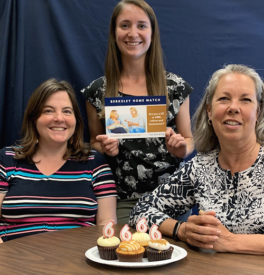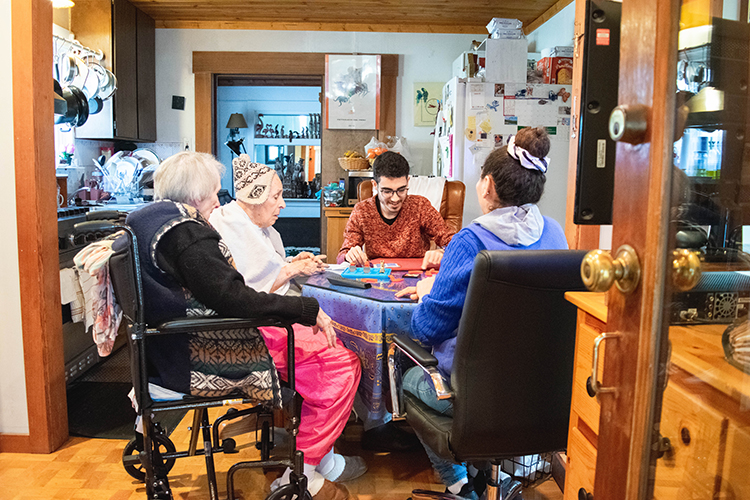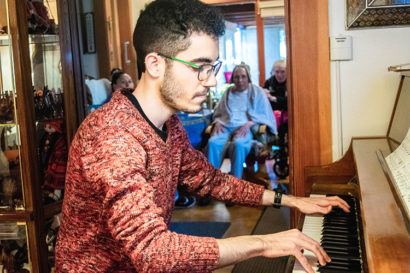Berkeley Home Match: A ‘nimble’ housing solution for students and retirees
The pilot program matches retired UC Berkeley faculty and staff homeowners with Berkeley graduate students, post-docs and visiting scholars looking for a place to live with rent that’s under the market rate
March 9, 2020

Edith Carrigan and José Manuel Redondo Hidalgo are part of a pilot program, Berkeley Home Match, which connects UC Berkeley retiree homeowners with Berkeley students looking for housing with rent under the market rate. (UC Berkeley photo by Irene Yi)
When UC Berkeley visiting scholar José Manuel Redondo Hidalgo was looking for housing in the Bay Area, he was blown away at the cost of living.
“I couldn’t believe how expensive it was,” Hidalgo says. “There was no way I could afford $1,300 for a room in a house, on top of other living expenses.”
But when he came across a posting for Berkeley Home Match on a campus housing listserv, he thought it could be the answer to his predicament.
Berkeley Home Match is a program that matches retired UC Berkeley faculty and staff who own homes with Berkeley graduate students, post-docs and visiting scholars who are looking for a place to live with rent that’s under the market rate. Run by the Berkeley Retirement Center — in partnership with Ashby Village, and with grants from the Chancellor’s Community Partnership Fund and the nonprofit, Covia — the pilot program is in its first year and has already made 11 successful matches.

From left: Cary Sweeney, director of the Berkeley Retirement Center; Rachel Bell, program manager of Berkeley Home Match; and Melissa Beidler, a Berkeley Home Match volunteer, celebrate after the team made its initial goal of six matches. This year, they’ve made 11 matches and next year, they are aiming to match 100 students and homeowners. (Photo courtesy of Cary Sweeney)
“Our goals are to connect graduate students and retirees to affordable housing, support our retirees for planning to age in place, and then also to build and strengthen intergenerational relationships,” says Cary Sweeney, director of the Berkeley Retirement Center. “We live in one of the most expensive housing markets in the country. Berkeley Housing Match is a nimble solution for getting people housing quickly, and then also building closer ties to the community and to Berkeley.”
In Spain, Hidalgo had heard positive things about other students’ experiences with similar programs, so he decided to give it a try.
First, he was asked to write a short bio about himself — what he was looking for in a living situation, how much he was willing to pay in rent, if he had allergies, pets or restrictions that would potentially limit who he could live with. Homeowners are asked to do the same, including listing their max rental price. They also provide photos and a description of their homes, all of which are located within two miles of campus. Although the amount a student pays in rent varies depending on the match, the average is less than $1,000 per month.
After Hidalgo submitted his bio, Berkeley Home Match looked at the homeowner applications and identified a person who met the same criteria: Edith Carrigan, who worked as an accountant for various departments at Berkeley for about 20 years, in the 1960s and ‘70s.

Hidalgo (center) plays games with Carrigan (far left), her husband, Victor Rivasplata (second to left), and his caregiver (right). “Before I came to Berkeley, I could imagine what it was like to be older,” says Hidalgo. “But you really don’t understand what the challenges are until you live it.” (UC Berkeley photo by Irene Yi)
“On the news, you hear about students who are sleeping in their cars, who don’t have money for food,” says Carrigan. “I know it’s kind of a desperate need. I always think about the community and I thought, this might be a way I could help.”
After Hidalgo and Carrigan spoke on the phone and had a video chat facilitated by Berkeley Home Match, the two clicked and could tell they would be compatible.
“From the very beginning, it felt like we were family,” says Hidalgo. “Now, we have dinner together most nights. We have seen plays and ballets in San Francisco. There’s no place I’d rather live.”

Hidalgo, who attended a music conservatory in Spain, often plays music — by Bach, Beethoven, Chopin, Mozart — on the piano for the household. (UC Berkeley photo by Irene Yi)
Although Hidalgo and Carrigan have developed a close friendship, companionship wasn’t a main reason that participants gave for becoming involved with the program, says Rachel Bell, the program manager. Some homeowners said they got involved to offset their carbon footprint or to become a mentor to a graduate student. Students mentioned the ease of living near campus as a perk. And consistently, both sides cited a desire to connect with the Berkeley community.
“Of course, one reason to participate is financial, either making extra income or paying reduced rent,” says Bell. “But right in line with that was the motivation to help one another.”
For Hidalgo, living with Carrigan and her husband, Victor Rivasplata, who has dementia, was the first time he had lived with older people — something that has given him a new perspective and experience that he finds valuable.
“Before I came to Berkeley, I could imagine what it was like to be older, but you really don’t understand what the challenges are until you live it,” says Hidalgo. “They introduced me to life in Berkeley. This experience has been very rewarding for everybody.”
Next year, program organizers aim to make 100 successful housing matches between UC Berkeley retirees and Berkeley students — something they hope will continue to strengthen the community for years to come.
Learn more about Berkeley Home Match, its partners and upcoming homeowner orientation.